12 Sneaky Reasons You’re Losing Hair, According to Doctors

Whether you’re a male or a female, losing your hair can be distressing, especially when the cause is unknown. And while experts say that oftentimes hair loss is simply the result of genetics and aging, there are a few more surprising explanations for your hair falling out or thinning. The good news? Some of these causes are reversible with the right interventions—you just need to know what to do. Read on to learn which sneaky things can cause hair loss, and how to reverse course.
RELATED: 8 Best Supplements for Hair Growth, Doctors Say.
1
Vitamin deficiencies

If you’ve noticed unexplained hair loss, you may need to turn your attention to your diet, as vitamin deficiencies are a surprising—yet somewhat common—cause for hair loss or hair thinning.
“A balanced diet is crucial for healthy hair growth,” explains dermatologist Zein Obagi, MD. “Certain nutritional deficiencies, such as inadequate iron, zinc, biotin, or protein intake, can impact the hair follicles’ ability to produce new hair strands.”
Though most people should be able to get the necessary vitamins and minerals through a balanced diet, “extreme or crash dieting can deprive the body of essential nutrients, including those crucial for maintaining healthy hair growth,” cautions Yoram Harth, MD, a board-certified dermatologist and the medical director of MDhair.
2
Taking too much vitamin A

On the flip side, sometimes getting too much of a vitamin can backfire. As Best Life recently reported, taking significantly more than the recommended amount of vitamin A in its form retinol (900 micrograms for men and 700 mcg for women) can cause hair loss.
“Taking too many supplements of the retinol kind over a prolonged period results in your hair follicles going into overdrive,” Michael May, FRCS, medical director and principal surgeon at London’s Wimpole Clinic, explained. “This means that your hair will reach the end of its development phase too rapidly and begin to fall out.”
However, when taken appropriately, vitamin A can actually stimulate hair growth.
3
Drinking a lot of soda

Add hair loss to the list of reasons soda and other sugary drinks are bad for you.
A 2023 study found that men who drink one sugary beverage a day, or a total of one to three liters a week, are 30 percent more likely to experience male pattern hair loss (MPHL) compared to those who drank none. This included soda, energy drinks, juice, and sweetened coffee drinks.
As Best Life reported at the time, the researchers “speculated that sweet drinks could lead to higher blood sugar levels, which has been found to trigger hair loss.”
And now, a review published last month found that both sugary drinks and alcohol can lead to hair loss. To arrive at this finding, the researchers analyzed 17 studies involving 61,332 participants, 97 percent of whom were women.
RELATED: Dermatologist Says These Are the 3 Best Shampoos for Thinning Hair.
4
Dermal filler injections

Dermal filler injections, used to treat wrinkles and create a more youthful appearance, can also cause hair loss, according to Kelly Johnson-Arbor, MD, a medical toxicology physician and interim executive director at National Capital Poison Center.
“When fillers are injected into the subcutaneous tissues, the small volume of fluid injected can cause pressure on blood vessels, blocking blood flow to nearby hair follicles,” she explains. “This is most commonly noted after filler injection into the forehead area. This type of hair loss frequently resolves over a period of several months.”
Hyaluronic acid and botulinum toxin (Botox) injections are two popular types that can lead to hair loss in rare instances. However, Johnson-Arbor notes that Botox is also sometimes used to treat hair loss, “as it relaxes the scalp muscles and leads to potentially improved blood flow to the scalp.”
5
Emotional or physical stress
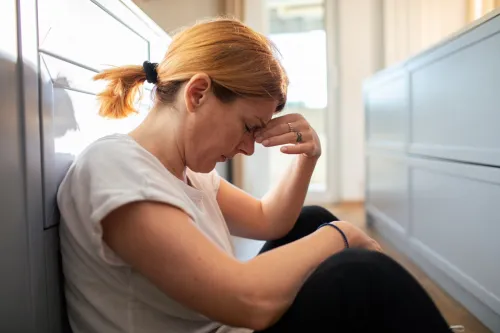
It’s not a myth that stress can cause your hair to fall out. Obagi notes that emotional and physical stress can disrupt the normal hair growth cycle, resulting in hair loss or hair thinning.
“When a person experiences a significant life event, undergoes emotional distress, or endures physical trauma, their body may divert energy away from hair growth, leading to temporary hair loss or telogen effluvium,” he explains.
However, the dermatologist notes that this type of hair loss is often reversible once the stress is managed effectively.
6
Medication side effects

“Hair loss can be an unintended side effect of certain medications, such as chemotherapy drugs, antidepressants, beta-blockers, or hormonal treatments,” says Obagi. “These medications can disrupt the hair growth cycle or induce telogen effluvium.”
Cleveland Clinic explains, “Telogen effluvium is a type of temporary hair loss caused by a stressor or change to your body.” It speeds up your hair’s natural growth-resting-shedding cycle so that more hair follicles enter that final phase at once.
Specifically, beta-blockers “change your body’s response to stress hormones, like adrenaline, to lower your heart rate and reduce blood pressure,” Brandi Cole, PharmD, pharmacist and nutritionist at Persona Nutrition, previously explained to Best Life. “These changes are thought to impact hair growth at the follicle and may stop new hairs from growing.”
Additionally, many people taking Ozempic and similar GLP-1 weight-loss medications have reported hair loss. Dermatologists say this is likely due to rapid weight loss sparking telogen effluvium.
If you suspect medication as the cause of hair loss, Obagi recommends consulting with a healthcare professional to explore alternative options or mitigate the effects.
RELATED: 17 Surprising Signs Your Hair Will Go Gray.
7
Certain hairstyles
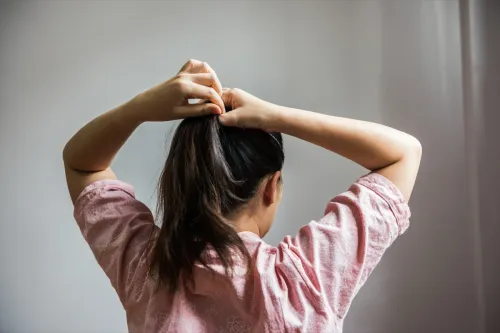
How you style your hair can also determine whether you get to keep it.
“Certain hairstyles that exert excessive tension on the hair follicles, such as tight ponytails, braids, or extensions, can lead to traction alopecia,” explains Obagi. This type of hair loss occurs when prolonged or excessive pulling on the hair follicles causes the hair strands to weaken and then break or fall out.
By opting for looser hairstyles and avoiding excessive heat, you can help prevent this form of hair loss.
8
Dry shampoos and chemical treatments
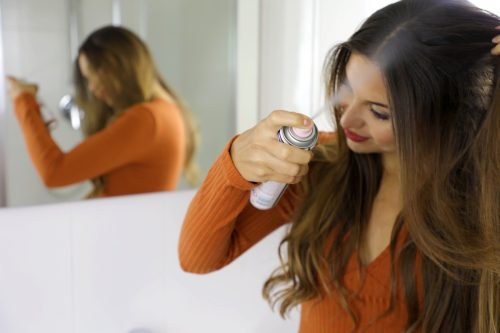
If you’re using dry shampoo as directed and still washing your hair with soap and water regularly, you shouldn’t have a problem. “However, overusing it can cause issues like buildup on the scalp, clogged follicles, and even increased shedding if you’re prone to it,” trichologist Hannah Gaboardi recently told Harper’s Bazaar.
“The overuse of dry shampoo can affect the hair follicle and clog the pores. This can cause a delay in the natural hair cycle and slow it down. This blockage does not allow your hair follicles to receive the nutrients and oxygen flow it needs for healthy hair,” she added.
Chemical treatments, including chemical hair straighteners, have also been found to cause hair loss. In fact, a 2022 study found that besides their association with hair loss and scalp inflammation, these types of treatments were also linked to increased incidence of eczema, pain, burns, changes in hair color, and more.
9
Heavy metal poisoning
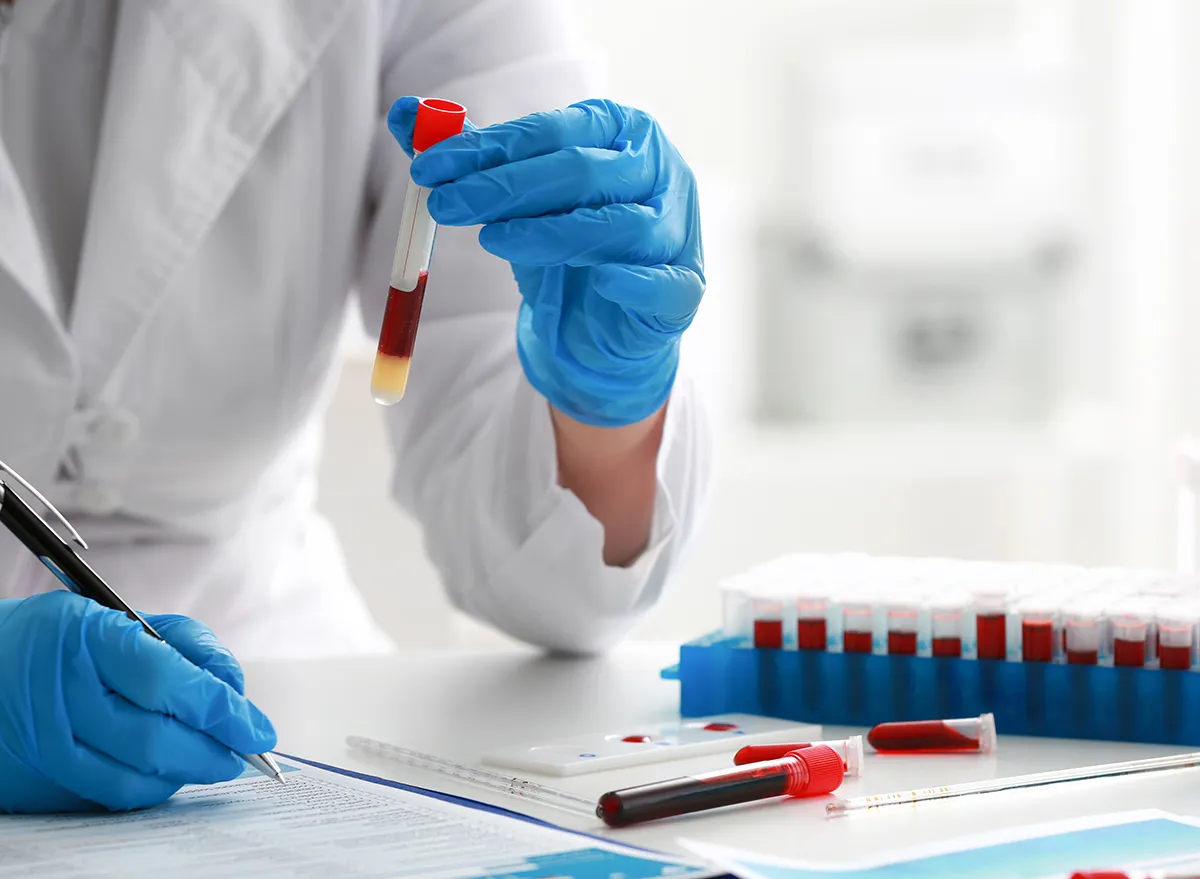
In rare cases, hair loss can indicate a serious underlying condition, such as heavy metal poisoning or exposure to toxic heavy metals. Johnson-Arbor tells Best Life that thallium and arsenic poisoning are the two types most likely to cause hair loss.
“In the human body, these heavy metals interfere with normal cellular metabolism and function, disrupting hair growth and other organ functions,” she explains. “Hair loss associated with heavy metal poisoning is often diffuse in nature and is typically accompanied by other signs and symptoms, including confusion, numbness and tingling in the hands and feet, and gastrointestinal disturbances.”
RELATED: I’m a Dermatologist and I’d Never Do These 6 Things to My Hair.
10
The seasons are changing

Many people report greater hair loss in the fall and winter months—and if that happens, it’s likely nothing to worry about.
“In the summer, we tend to hold on to more hair to provide increased protection from the sun, and in the colder months, more hairs than normal fall out to make way for thicker hair growth for the winter,” Gökhan Vayni, a hair specialist at Vera Clinic, previously told Best Life.
“Excessive hair loss in winter is largely due to the dry air outside that dries moisture from your scalp,” Vayni added. “A dry scalp leads to dry hair, which in turn results in hair damage, breakage, and hair loss.”
11
Autoimmune conditions
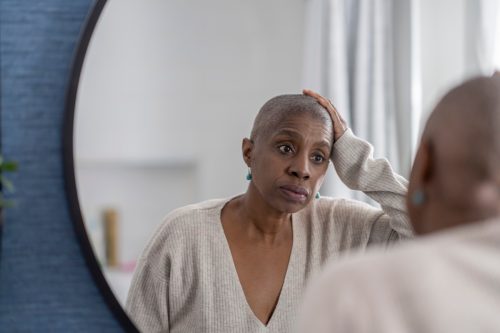
If you notice unexplained hair loss, it’s important to discuss your symptoms with your doctor. They may want to screen you for certain autoimmune conditions, among other things.
“Autoimmune conditions, such as alopecia areata, can cause hair loss by mistakenly attacking the hair follicles,” says Obagi. “This results in the interruption of the hair growth cycle and subsequent hair loss. Treating the underlying autoimmune condition and seeking appropriate medical intervention can help manage hair loss in such cases.”
12
Hormonal changes

Finally, hormonal fluctuations can play a significant role in hair loss.
“Pregnancy, childbirth, menopause, and conditions like polycystic ovary syndrome (PCOS) can cause hormonal imbalances that impact the hair growth cycle,” Harth notes. “These changes can lead to temporary hair loss or even permanent hair thinning.”
Speaking with a healthcare provider specializing in hormonal health can help address the underlying causes and manage any associated hair changes.
- Source: Nutrients: The Association between Sugar-Sweetened Beverages and Male Pattern Hair Loss in Young Men
- Source: Nutrition and Health: Assessing the relationship between dietary factors and hair health
- Source: Cleveland Clinic: Telogen Effluvium
- Source: Anais Brasileiros de Dermatologia: Effects of chemical straighteners on the hair shaft and scalp